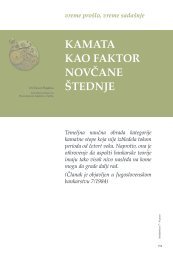swift - Udruženje banaka Srbije
swift - Udruženje banaka Srbije
swift - Udruženje banaka Srbije
- TAGS
- swift
- banaka
- srbije
- www.ubs-asb.com
You also want an ePaper? Increase the reach of your titles
YUMPU automatically turns print PDFs into web optimized ePapers that Google loves.
ankarstvo � - � ����<br />
��<br />
Second, we want to a�ract new players to<br />
connect to the network as well. These can be<br />
corporates, investment intermediaries, and<br />
insurance companies to name some examples.<br />
It is clearly not the goal to open our network<br />
to everybody, but to all players where it makes<br />
sense for the financial industry.<br />
But isn´t SWIFT because of its high<br />
requirements regarding security and resilience<br />
by far too expensive for a small corporate?<br />
It depends. For a carpenter who has 10<br />
payments per month, it simply doesn´t make<br />
sense. But for medium corporates it might<br />
be an important advantage to have one single<br />
channel to communicate with ALL their<br />
banking counterparties. One channel and also<br />
standardization on the content, e.g sending all<br />
payment instructions in the same format and<br />
receiving all account statements in one format.<br />
Wouldn´t this be a real improvement for the<br />
whole industry?<br />
As you are spending the majority of your<br />
time with financial institutions, I guess the<br />
financial crisis is still discussed on a regular<br />
basis? When do you think we will go back to<br />
“normal” business?<br />
Well, I think the incidents in the last year<br />
have changed the financial industry forever.<br />
Concerning SWIFT, we have seen the first time<br />
in our history a decline in message volumes on<br />
an overall basis. What is good news is that it is<br />
recovering again which can be taken as a sign<br />
of relief.<br />
Talking about how SWIFT can help<br />
customers to tackle the crisis:<br />
We certainly have observed in the interaction<br />
with our customers the increased interest about<br />
liquidity and cash management as a direct<br />
consequence. Today, mostly cash positions are<br />
consolidated at best at a daily basis. Very o�en<br />
even less frequently. This means higher risk<br />
and also less possibility to gain interest on your<br />
working capital.<br />
By using SWIFT, customers can use so-called<br />
intra-day statement messages which can be<br />
integrated directly with Back-office systems. I<br />
can tell you: Treasurers very much like this.<br />
Moreover, identifying and tackling risks<br />
have also moved up in the priority list. As<br />
a concrete example: Higher automation<br />
and faster processing cycles does not just<br />
mean be�er customer service and less cost. It<br />
minimizes the risk that your counterparty goes<br />
bankrupt while a payment or a trade is not yet<br />
se�led. Simply, because the se�lement goes<br />
faster!<br />
In the moment, the payment market is in motion.<br />
What do you see as the biggest challenges for<br />
financial institutions in this area?<br />
You are right. Payments which sometimes<br />
have the reputation of being very conservative,<br />
stable, boring - however you want to put it,<br />
suddenly becomes a dynamic area again.<br />
Besides recent changes due to the financial<br />
crises which I´ve described earlier and on-going<br />
initiatives from regulatory bodies - throwing<br />
in the buzz word “SEPA” - like the European<br />
Union and the European Payments Council,<br />
of course customers are raising the pressure.<br />
Processing payments reliably is a MUST, a nobrainer.<br />
Of course, prices are always important.<br />
But if banks want to distinguish themselves,<br />
they need to provide additional services.<br />
What services do you mean?<br />
Well, one important thing is how banks<br />
are dealing with exceptions, e.g. if a payment<br />
needs to be modified or even cancelled a�er<br />
the se�lement. Another significant criterion<br />
is how transparent the whole payment chain<br />
is. What if the payment has not reached the<br />
beneficiary? Is the payment provider able to<br />
investigate in a transparent and rapid way?<br />
Those are the decisive moments in a bank to<br />
corporate relationship and are sometimes more<br />
important than pure pricing.<br />
Probably no surprise for you:<br />
SWIFT has worked with the financial<br />
industry to issue a standard to automate<br />
the typical exceptions and investigation<br />
scenarios. Automation which yields be�er<br />
customer service and less costs for the financial<br />
institutions.













